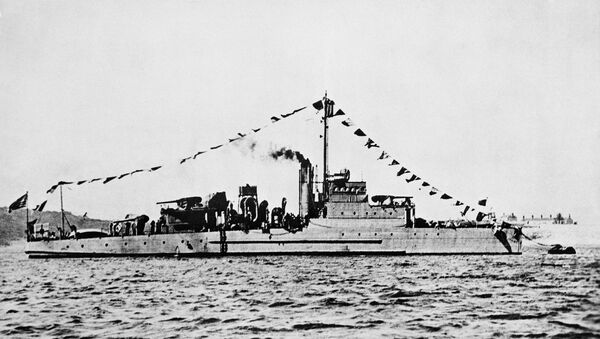Discovered just five miles off the coast of Maine’s Cape Elizabeth, the vessel is situated some 300 feet below the surface of the Atlantic Ocean. Inside the doomed USS Eagle PE-56 are the remains of 49 of the ship’s 62 crew members, who died after the vessel was stuck by a torpedo from German U-boat, U-853.
The revelation was announced by Garry Kozak, a specialist in undersea searches who has worked on numerous high-profile operations, including that of the disappearance of flight MH370.
Ryan King, a member of the technical dive team that pinpointed the ship’s location, told the New York Times that “when you see a four-inch deck gun, you know you’re not dealing with a fishing boat.”
The diver went on to note that the torpedo that blasted the USS Eagle had torn apart the vessel’s bow and stern, but that its anti-submarine munitions were very much still intact. “You realize you are looking at a rack of 15 to 20 depth charges … it’s a sobering thought,” he added.
The search for the USS Eagle included many experts and historians. Paul Lawton, a naval historian and lawyer from Massachusetts, was the first to take up the search for the warship after he came into contact with two local firefighters who’d mentioned that their father had died aboard the ship, the Times reported.
The warship reportedly sunk to the bottom of the ocean within a 15-minute timeframe. Despite having a multitude of eyewitness accounts on the day of the ship’s demise, Lawton, fellow researchers and the dive team hit wall after wall in their arduous search efforts.
“We just couldn’t believe how a ship could just disappear,” Lawton told the outlet of the team’s early efforts. Decades would ultimately go by before a review of Kozak’s sonar images by the dive team proved fruitful. Their discovery of the long lost warship was made in June 2018.
Within the past year, the team has revisited the site about 20 times, recording underwater footage of the area, which will be aired in the fall of 2019 as part of the Smithsonian Channel’s “Hunt for Eagle 56” special.
The Smithsonian released a statement, saying the team’s “discovery of the wreck reveals the truth and settles this historical question [regarding the cause of the vessel’s sinking.]”
Although the ship was initially thought to have suffered a boiler explosion at the time, in 2001 the US Navy recognized that it had indeed been sunk by the U-853.
As for the German U-boat, it was sunk by a US Navy destroyer on May 6, 1945, after attacking a cargo ship. The submarine, which lies 130 feet below the surface, sits roughly eight miles from Block Island in waters along Rhode Island.

